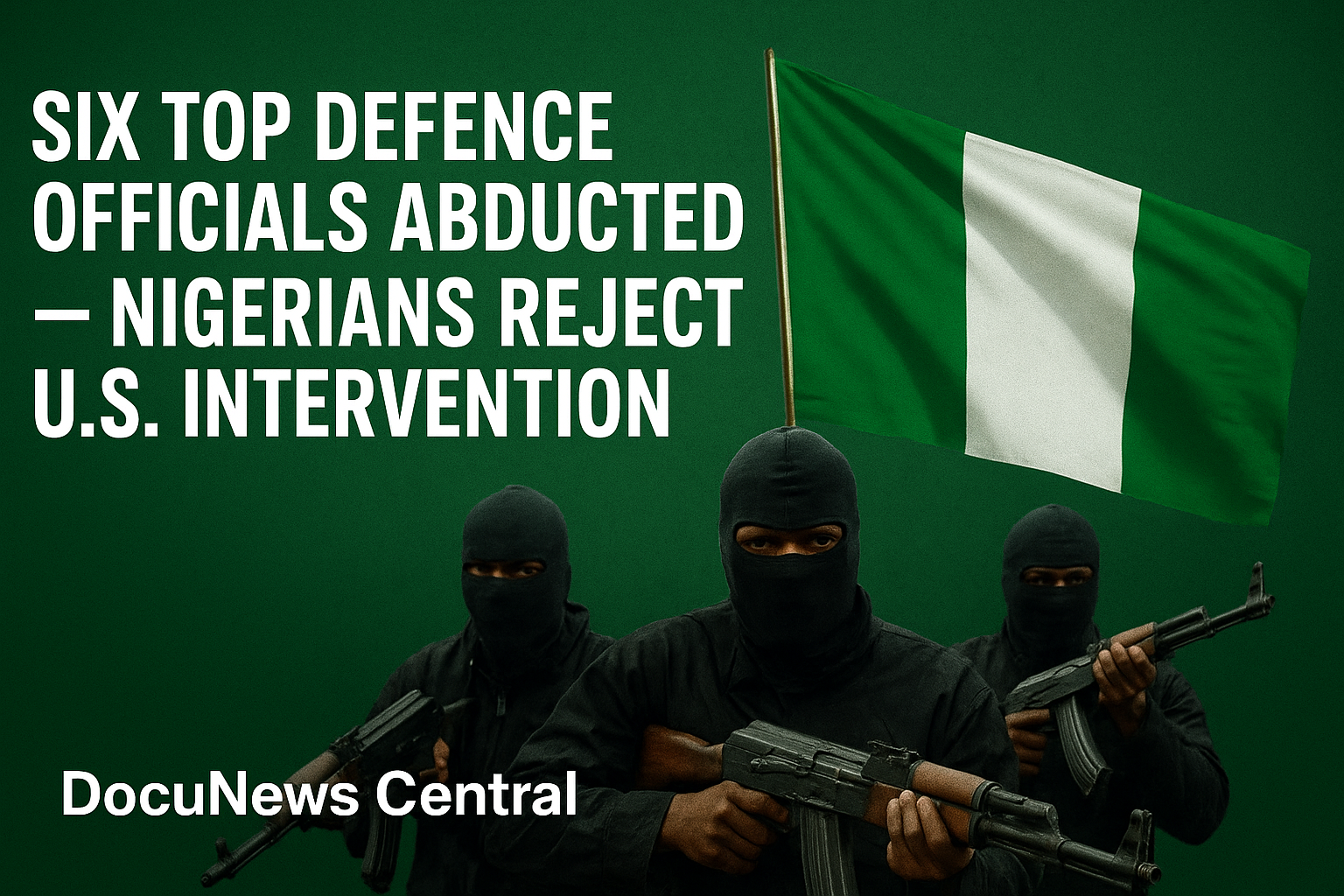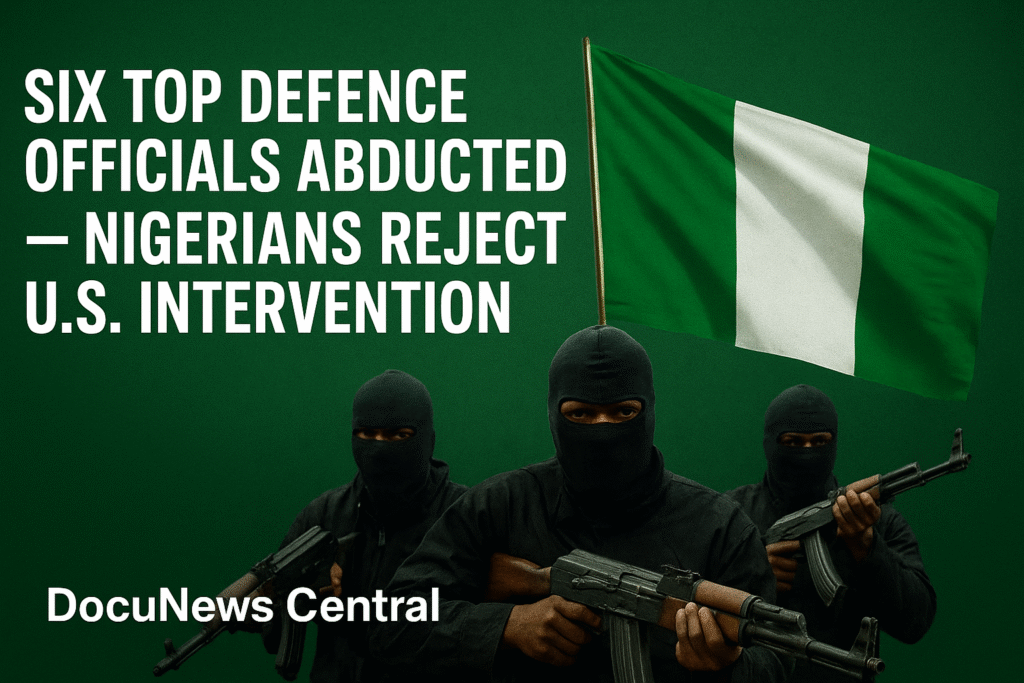

Abuja, Nigeria — In a shocking turn of events, gunmen suspected to be kidnappers have abducted six senior directors of the Federal Ministry of Defence. Among the victims is a female official. The high-profile abduction occurred along the Lagos–Abuja highway in what security experts describe as a well-coordinated and strategic ambush that raises fresh questions about Nigeria’s worsening security situation.
How the Abduction Happened
According to eyewitness accounts, the officials were en route to Abuja to take part in a crucial directorate-level promotion examination when their convoy was intercepted by heavily armed men. The attack reportedly happened in the early hours of the morning, near a forested section of the expressway notorious for recent kidnappings.
Sources said the assailants, numbering more than a dozen, blocked the highway with vehicles and opened sporadic gunfire into the air to cause panic. They then forced the convoy to stop and ordered the directors out of their vehicles before whisking them into the bush. Several personal items, including phones and laptops, were also carted away.
Security personnel were immediately alerted, and a joint team of Nigerian Army, Police, and DSS operatives began a search-and-rescue operation. However, as of the time of this report, no contact has been made with the kidnappers, and no group has yet claimed responsibility for the abduction.
Public Fear Grows Over Targeted Attacks
The abduction of top Defence Ministry officials has sent shockwaves through Abuja and across the country. Many Nigerians are now questioning how such a daring operation could succeed against senior defence personnel, especially on one of the nation’s busiest highways.
“If senior Defence officials can be kidnapped in broad daylight, what chance do ordinary citizens have?” asked a civil servant reacting to the incident on social media.
This latest event adds to a worrying trend of high-profile kidnappings that have hit Nigeria’s public sector. Just last month, several INEC officials were attacked in Kogi State while returning from election duties, underscoring how unsafe many public routes have become.
Rising Insecurity Despite Heavy Security Spending
Nigeria’s defence budget has risen significantly over the last decade, yet banditry, terrorism, and kidnapping continue to threaten the safety of citizens. According to analysts, the problem lies not just in funding but in accountability, corruption, and poor intelligence sharing between agencies.
Human rights activists and opposition politicians have accused the government of focusing too much on political battles instead of addressing the core security issues. “The abduction of Defence directors is a national embarrassment,” said one senator. “It proves that even those tasked with defending the country are not safe.”
Reports suggest that the abducted officials were part of a critical policy unit working on national defence reforms. Their disappearance, therefore, poses both personal and institutional challenges for the ministry.
Nigerians React: ‘We Don’t Need U.S. Intervention’
Following the abduction, Nigerians flooded social media platforms with angry reactions, criticizing calls for U.S. or foreign intervention in the country’s security affairs. Many pointed to recent comments linking America and Trump to Nigeria’s internal security discussions as unnecessary and hypocritical.
“We don’t need Trump or any foreign power to rescue us,” one Twitter user wrote. “We need our leaders to be honest, transparent, and accountable. It’s hypocrisy to ask for U.S. help while failing to fix our local security system.”
Another user commented that such incidents reveal how deep Nigeria’s security collapse has become. “If the Defence Ministry itself can’t protect its directors, then our national security structure is broken,” he said.
Government Response and Ongoing Rescue Operations
The Ministry of Defence, through an anonymous senior official, confirmed the abduction and stated that efforts are underway to locate the victims. Security agencies have been instructed to prioritize the case and provide hourly updates to the Presidency.
Meanwhile, the Nigerian Police Force has deployed tactical units, including anti-kidnapping squads, along the Lagos–Abuja corridor. According to recent police statements, drones and ground patrols are being used to track movement within the forested areas where the suspects are believed to be hiding.
The Defence Headquarters also urged citizens to remain calm and avoid spreading panic or unverified information online, assuring that all necessary measures are being taken.
Political Reactions and Calls for Reform
Opposition leaders have seized the opportunity to renew calls for comprehensive reforms in Nigeria’s security sector. They argue that centralizing control under the federal government has slowed down responses and weakened local intelligence.
Several civil society organizations have also joined the call, suggesting that state police and community-based intelligence networks may help bridge the gap between citizens and law enforcement. “Security is everyone’s business,” said a spokesperson for the Nigerian Security Reform Network. “But without trust and collaboration, no military spending will ever be enough.”
Meanwhile, human rights lawyer Femi Falana (SAN) called for transparency in how security funds are allocated and used. He noted that billions of naira have been spent yearly, yet insecurity remains rampant across all six geopolitical zones.
Fear on Major Highways and Economic Impact
The Lagos–Abuja expressway has become a symbol of Nigeria’s insecurity crisis. Transport companies report rising insurance premiums, while private motorists increasingly rely on convoys for safety. The economic implications are huge — transportation costs are climbing, and businesses are losing valuable time and resources.
“Every time a kidnapping happens, it doesn’t just affect the victims. It affects the whole economy,” said an economist in Lagos. “People are afraid to travel, and logistics companies spend more to protect their goods and staff.”
In recent weeks, the Federal Road Safety Commission has warned travellers to avoid night journeys and report suspicious activity along major routes. Yet, despite these warnings, criminal gangs continue to operate freely in many rural areas, often targeting commercial vehicles and government convoys.
International Concerns and Nigeria’s Image
International observers have also expressed concern over the abduction. Analysts fear that such incidents could harm Nigeria’s diplomatic reputation and discourage foreign investment. “When top defence officials can be abducted without resistance, it sends a dangerous message to investors,” said a London-based security analyst.
Nevertheless, Nigerians on social media have remained adamant that the solution must come from within. “Foreign powers can only help to an extent,” one commentator wrote. “The real change must start with reforming our local policing and judicial systems.”
Conclusion: A Wake-Up Call for Nigeria’s Leaders
The abduction of six top Defence Ministry directors is more than just another kidnapping incident. It is a symbol of how deeply insecurity has infiltrated Nigeria’s system — even among those charged with defending it. The event serves as a wake-up call to the government to not only rescue the victims but also to rebuild public confidence in the nation’s security apparatus.
As investigations continue, Nigerians are watching closely, hoping that justice will prevail and that the abducted officials will return home safely. Until then, this tragedy remains another reminder of the urgent need for leadership, unity, and reform.
Related News
- Viral Video of Alleged U.S. Troop Arrival in Nigeria Sparks Confusion — Presidency Reacts
- Russia Says It Is Closely Monitoring Reports of Possible U.S. Military Action in Nigeria
- Shi’ite Members Storm Kano Streets to Protest U.S. Threats Against Nigeria
- Nigerian Army Reacts to Rising Cases of Kidnapping Nationwide
- Police Launch New Anti-Bandit Operations Across Northern States
Source: DocuNews Central






